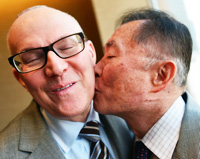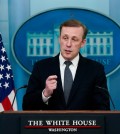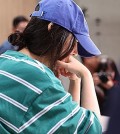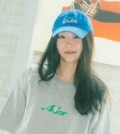- California Assembly OKs highest minimum wage in nation
- S. Korea unveils first graphic cigarette warnings
- US joins with South Korea, Japan in bid to deter North Korea
- LPGA golfer Chun In-gee finally back in action
- S. Korea won’t be top seed in final World Cup qualification round
- US men’s soccer misses 2nd straight Olympics
- US back on track in qualifying with 4-0 win over Guatemala
- High-intensity workout injuries spawn cottage industry
- CDC expands range of Zika mosquitoes into parts of Northeast
- Who knew? ‘The Walking Dead’ is helping families connect
George Takei visits S. Korea to urge compassion for LGBT community
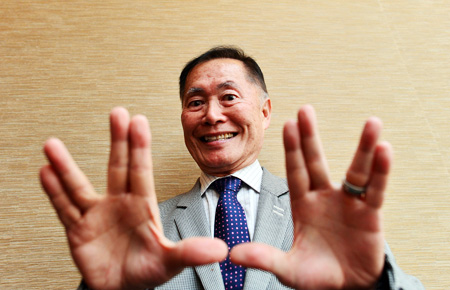
Actor George Takei gives the “Vulcan salute” popularized by the original “Star Trek” television series, during an interview last Friday at the Westin Chosun hotel in downtown Seoul. (Shim Hyun-cheol / The Korea Times)
By Kim Young-jin
When George Takei enters a room, it’s hard to imagine the actor ever being uncomfortable in his skin. He is ready to break into a smile at any moment, or give a deep hearty laugh. His baritone voice booms with confidence.
Indeed, Takei, best known for playing Lieutenant Hikaru Sulu in the television series “Star Trek,” has always been an extrovert. He was popular at his Los Angeles high school, even getting elected for class president.
But beneath the facade, he harbored deep insecurities due to sexual identity issues.
“I felt very isolated as a child, my early teens,” Takei, 77, told The Korea Times in Seoul last week. “I grew up covering up whatever insecurities I had by acting like the norm.”
So it is understandable that the actor grows serious when discussing the plight of lesbian, gay, bisexual and transgender (LGBT) people in Korea, where harsh stigmatization keeps many living in fear that their sexual identity will be revealed.
Takei believes the onus is on parents of LGBT people to love their children unconditionally ― a tall task in a country that staunchly prioritizes the continuation of the family line.
“There’s this sense of gay people (in Korea) being made to feel worthless,” said the Los Angeles native, who met LGBT rights activists during his stay.
“You say there is the Confucian ethics. But the core unit of a society is the family. Parental love for their child, and the child’s love for the parents, and sibling love ― that’s the glue that holds that unit of society together. When parents prioritize some ancient belief over parental love for the child, it’s unnatural.”
The Japanese-American actor and his husband, Brad Takei, were in on a speaking tour of Korea and Japan organized by the U.S. State Department. While he conversed with people on a wide range of topics― from acting to geopolitics ― he calls gay rights the issue that is “closest to me.”
Sexual minorities here say that coming out is difficult due to parental pressure to marry and pervasive homophobia in the workplace. Moreover, the country’s powerful Christian lobby has long prevented passage of anti discrimination legislation that would protect gays and other groups.
Long road to advocacy
Takei faced a similar environment when he began his acting career in the 1950s.
“The climate was dramatically different from today,” he explained. “No producer would hire you … the ratings would plummet if the producer hired a gay actor.”
For Takei, the journey to where he is today ― a vocal proponent for gay rights and other social justice issues ― was long and often marked by silence.
After Star Trek creator Gene Roddenberry cast him as Sulu, Takei remained quiet about his sexuality. However, he still wanted to participate in the political process.
That desire was instilled by his father, who preached the virtues of American democracy even after the government sent thousands of Japanese-Americans ― including the Takei family ― into internment camps after the bombing of Pearl Harbor.
In high school, Takei grew confused when he could not find any information about the internment in textbooks, wondering aloud why people did not protest more.
“I’d read about the shining ideals of our democracy,” he recalled. “I couldn’t reconcile that with what I knew to be my childhood.”
His father’s response was to teach Takei about the virtues of democracy, taking him to volunteer for the presidential campaign of Illinois Democrat Adlai Stevenson.
Since then, Takei has vigorously taken part in politics. He marched with Martin Luther King Jr. during the civil rights movement; protested against the Vietnam War and was a delegate to the 1972 Democratic National Convention. He testified during congressional hearings about Japanese internment.
Still, the actor remained tight-lipped about his sexuality, coming out only to his closest friends.
Turning point
“The irony is, at the same time I have been an activist in the political arena … I was silent on the issue that was closest to me,” said Takei, who remembers looking for the exits each time he went into a gay bar, in case it was raided.
That all changed in 2005, when then-California Governor Arnold Schwarzenegger vetoed legislation that would have given same-sex partners the right to marry.
“My blood was boiling but I was still silent,” Takei said.
“That night, Brad and I were watching the late evening news and we saw young people pouring out on to Santa Monica Boulevard venting their anger and rage … I felt I needed to participate in that. To do that, my voice had to be authentic. So I spoke to the press for the first time and I blasted Schwarzenegger’s veto.”
When California made same-sex marriage legal in 2008, Takei and longtime partner Brad Altman were among the state’s first gay couples to obtain a marriage license.
Today, Takei is a leading advocate for LGBT rights and has a large social media following, including on his Facebook page, which has more than 7 million likes. He remains a fixture in the zeitgeist, regularly appearing on talk shows such as “The Howard Stern Show” and”Conan.”
He believes the situation is changing for LGBT people worldwide, and hopes Korea will follow.
“Gay people exist throughout society as we’re seeing in America,” hes aid. “In a macho arena like pro football, Michael Sam comes out and gets drafted to a team and in joy he kisses his boyfriend on camera. Korea’s society is filled with gay people, LGBT people … from the high to the low.”
The actor stressed the role of parents in giving equal opportunity to LGBT youth.
“I have a message for parents of LGBT people,” he said. “Love your child.”







